#CBC diversity
Explore tagged Tumblr posts
Photo

The Superficial Diversity of Canadian TV
How risk avoidance shapes our entertainment
Interviews with executives and advocates within Canadian film and television point to the people in power—those who use imaginary risk as an excuse not to change—as the actual risk to everyone else. They are the biggest impediment to an inclusive television industry that actually reflects Canadians. In the words of Valerie Creighton, president and CEO of the Canada Media Fund (CMF), which helps finance most of the country’s domestic programming, “We don’t have a problem creatively. We have a problem with our structure that has to be blown up.”
Read more at thewalrus.ca.
Illustration by blackpowerbarbie (blackpowerbarbie.com)
#Entertainment#Media#Television#Diversity#CanCon#CBC#Illustration#June 2022#Soraya Roberts#blackpowerbarbie
15 notes
·
View notes
Text
Trump administration orders all federal diversity, equity and inclusion employees to be furloughed | CBC News
US President Donald Trump’s administration moved Tuesday to end affirmative action in federal hiring, ordering all federal diversity, equity and inclusion (DEI) staff to be placed on paid leave and eventually be dismissed. The measures follow an executive order. Trump signed on his first day order a sweeping dismantling of the federal government’s diversity and inclusion programs that could…
1 note
·
View note
Text
Pas de Deux Chapter 1
Din Djarin x f!reader | 2.9k | fic masterlist | main masterlist | ao3

fic summary: When Din Djarin – principal dancer at Concordia Ballet Company and generational talent in the classical style – suddenly left CBC and joined the Nevarro Ballet Theater mid-season, it shocked the ballet world. You never would have guessed that he would change your life, too.
a/n: here we go! Chapter 1 starts sometime in late fall, November-ish. See my notes on the masterlist about reader in this fic and ballet in general. Thank you @katareyoudrilling for being the best beta, as always!!
chapter tags/warnings: gen, ballet terms (see end notes and the masterlist for definitions), a bit of angst
Chapter 1
“‘In a surprise move that shook the dance world, the Concordia Ballet Company announced yesterday that they have parted ways with principal dancer Din Djarin.’”
You could hear the sudden gasps through the open door of the large studio as you walked towards it. You recognized Clara’s voice as she read the news aloud, you assumed from her phone.
“‘Djarin, 27, who trained at the rigorous Concordia Ballet School from a young age, has been with CBC for 10 years and is in the prime of his career. He was promoted from soloist to principal two years ago, as is the norm at CBC, where they do not promote dancers younger than 25 to principal. His performances have been highlights on the CBC schedule over the last two seasons, earning many rave reviews.’”
You turned the corner to enter the studio and found most of the company class crowded around Clara as she looked down at her phone.
“‘The CBC press release did not indicate the reason for the split, which only makes this mid-season decision more disconcerting for fans and donors alike.’”
The group around Clara murmured and shifted their weight. You had just read the article on the bus and knew what was coming next. You slid down to sit against the wall by the door, watching.
“‘This decision comes amidst the company’s preparation for spring and for the last show on their fall schedule, Don Quixote, with no explanation as to how their roster of principals and other dancers may be adjusted to compensate for this enormous loss. Djarin is well known for his powerful physique, technical mastery, and classically perfect performances.’” Clara paused, and then continued, “then it talks about some of his work, we know all of that already, blah blah blah, ok whoa!” She gasped. “Ok. Listen to this – ‘Djarin has not been available for comment, but was seen boarding a flight to Nevarro two days ago before the announcement was made public!'”
You started to put on your shoes for barre and watched as everyone else in the room started to completely freak out.
“Here?!” Owen exclaimed, hand thrown over his mouth. “Is he coming here here?” He gestured around the studio as he asked.
Clara shrugged. “It doesn’t say, look, that’s the end of the article.”
Sophie had started rising up and down on the balls of her feet by one of the barres and you weren’t sure if she was aware she was doing it. Her tone was excited as she asked, “would he come here? Why? We’re, like, not his style.”
The room broke down into several noisy conversations at that point, and you felt your friend Adrian slip down the wall to sit next to you. “So, what do you think?” he asked, nudging your shoulder.
You shrugged. “No idea. I can’t see any reason he’d even want to come here. CBC is so…” You trailed off, but he knew what you meant.
“Yeah. Traditional. Rigid. Not like us at all.” Adrian waved his hand towards the mismatched group of dancers in front of you and you both smiled. The Nevarro Ballet Theater was different from the Concordia Ballet Company in many ways, and the diversity of dancers in the company was one of the things that set NBT apart the most.
You nodded. “Right. If his flight destination even means anything.”
“If it does, what would that mean for us?” Adrian looked around the room. “We already have a full roster of soloists and principals.” He bit his lip. He looked nervous, and he wasn’t the only one — you noticed Sasha, Lu, Carlos, and Isaac were huddled around the bar, clearly worried. All principals, you assumed they were nervous about losing out on parts. For Adrian, you knew it was because he had just made soloist at the start of the season. A new superstar coming in might shake things up too much.
You nudged his shoulder with your own. “I was thinking about that when I read it on the bus. I don’t think you have anything to worry about. I heard what Karga said, about how good you are.”
He nodded, but didn’t look reassured. “At least you don’t have anything to worry about, Ms. Soon-To-Be-Principal.”
You rolled your eyes and shoved down the anxiety lurking in your stomach. You’d made soloist a couple of years ago, and then first soloist this season. There were some people (including Adrian) who seemed to think you’d be promoted soon, as early as the end of the current season. But there were at least a few critics who disagreed, and for months you’d been having trouble putting the words of one in particular out of your mind. You could quote it from memory:
“While her lyricism and skill are undeniable, one wonders if she has the artistry or stage presence to carry a narrative. She more than deserves the promotion to first soloist, but is this her ceiling?”
You wished you’d never read the article, but it had seemed to be the usual season preview and you hadn’t been expecting the targeted commentary. You’d spent the last few months trying not to think about it too much, or you knew you would get all in your head about it.
“Shut up.” You nudged him again and he laughed.
He opened his mouth to respond, but he was interrupted by the door opening next to you. It wasn’t your teacher who walked in, though, and once you saw who it was you both leapt to your feet.
Greef Karga, director of the Nevarro Ballet Theater, looked happy, but then he usually did.
“Good morning, dancers!’ His voice was deep and loud and you all scrambled into a semi-circle facing him at the door, where your ballet instructor, Alexa, followed him in. You chorused a “good morning” in response.
“I’m sure you’ve all seen the news,” Karga continued, with a knowing smile on his face. “And you must be wondering why I’m here!” You glanced in the mirror and noted that everyone did indeed look both curious and a little wary. “Well, I am very pleased to confirm that Din Djarin will be joining us for the rest of the season here at NBT.”
There was some general murmuring and shock in response, but he was not deterred.
“I know we’re in the middle of the season, with many roles already planned. Din and I have agreed to try not to disrupt that too much this year. We’ll be adding some things to the anniversary gala and the mixed programs.” That made sense — the latter were showcases of the work of different composers and choreographers and could be more easily rearranged to include a new dancer. “We won’t be making any changes to Midsummer, Swan Lake, or Cinderella, which I know we’re already planning for and rehearsing.” You felt Adrian take a deep, relieved breath beside you. He was supposed to be Puck this year for the first time and it sounded like that wasn’t going to change.
“Din will start joining your classes and the rehearsals for the gala and other programs over the course of the next two weeks. Please introduce yourself and welcome him — we are very excited to have him join us.”
You all nodded, of course, even though you knew a lot of your fellow dancers would be wary of the newcomer.
“Well!” Karga clapped his hands together and smiled. “I’ll let you get started. Continue with your rehearsals as normal unless you hear otherwise. Have a wonderful day, everyone!”
Alexa moved towards the stereo system in the corner as Karga swept out of the room, and you turned to look at Adrian.
“Well,” he said, turning towards his usual place at the barre. “This should be interesting.”
You nodded as Alexa turned on the music and you took your usual spot next to him at the barre. It definitely would be.
…
After all that excitement, you didn’t even see Djarin for a few days. He didn’t join the morning company classes right away, but you couldn’t really blame him — moving suddenly across the country wasn’t easy. It didn’t stop you from glancing around every room as you entered, trying to catch sight of your elusive new company member.
You heard from the others that he’d dropped by a couple of rehearsals, and they’d overheard him talking about plans for the mixed programs with some of the choreographers and other staff, including Talia and Jee. You wondered if he’d ever met Kuiil, the current guest choreographer in residence, who traveled and usually worked with different companies every few years. You somehow doubted it — Kuiil’s style was much too contemporary for CBC.
You’d been in rehearsals for Nutcracker and Midsummer all week, though, so you weren’t really surprised that you hadn’t run into him yet.
Finally, on Friday morning, you arrived early for class to find a group of your fellow company members huddled by the mirror and staring awkwardly across the room. You followed their gaze and found Din Djarin, in the flesh, warming up at the barre. For a moment you couldn’t reconcile the sight of him in your familiar space. He was tall and imposing, and dressed all in black — black ballet shoes, black tights, black sweats that cut off below his knees, and a tight black long sleeve shirt that showcased the breadth of his shoulders and just how strong he was. His curly brown hair was tousled. His signature mustache, somewhat uncommon in ballet, was in place, though you knew he often shaved for performances — there had been articles about his daring breach of the Concordia status quo when he didn’t. At least at NBT he’d be allowed to keep it, you thought. His face was blank, completely expressionless as he stretched.
You knew he had to know the rest of the group was watching him, and when you glanced back and found them still huddled you sighed. You felt someone step into the room behind you and turned to find Adrian taking in the standoff.
He shook his head. “Great start.” His tone was dry, and you laughed under your breath.
“Should we say hello?” You sat to put on your ballet shoes and Adrian sank down beside you.
“Who, us?” Adrian raised an eyebrow at you. “Do I look brave to you?”
You laughed again, and were about to suggest going together for moral support when Alexa walked in. She took in the situation and sighed, shaking her head as she crossed the room to where Djarin was still warming up alone.
“Look! Alexa took care of it.” Adrian nudged you and smiled. “No need for us to take one for the team after all.”
The two of you watched as she spoke with him, though you couldn’t hear what they were saying. He nodded at her, and she smiled before walking towards the stereo.
“Alright, let’s get started!” She called out without looking to see if anyone listened, but you all did. You realized as you took your normal spot that you were diagonal from Djarin across the space between two of the barres in the middle of the floor. You’d be able to see him whenever you were working your left side, and somewhat in the mirror on your right. You resolved not to stare.
You only sort of succeeded.
The problem, you quickly realized, was that his movements were beautiful. Even while doing simple pliés or tendus you could see the power in his body, the strength in his muscles, the rigor of his training. Every movement was precise, clean, and perfectly placed. The elegant line of his arm and the curve of his hip drew your gaze like a magnet, over and over again. His effortless coordination and control were mesmerizing. You watched the slow extension of his leg into grand battement until you had to force yourself to tear your eyes away.
Well, you thought, he certainly lives up to all of the hype about technique. CBC had a reputation and he more than exceeded it.
It made you painfully aware of the limits of your own abilities. You knew you were good – you’d made it this far, of course, and now you were first soloist, despite having what was seen as a late start in ballet (at age 7). And despite what the critics said, you were considered to be one of the better technicians at NBT. But you were no match for his level of skill, for the rigorous training you’d heard about at CBC. That much was obvious just from looking at him.
You tried to clear your mind as the class continued, knowing your worries would start to show in your movements if you let them. It was hard to do that when so much strength and technical perfection stood only five feet away from you, demonstrating the ideal version of every move and transition that you attempted.
As you finished at the barre and quickly put on your pointe shoes to work in the center of the room, you finally put it out of your mind. There was no use in comparison, you’d learned that a long time ago. In the end, the only dancer you could compete with was yourself. And NBT was not a company that encouraged that kind of competition among dancers anyway.
You found your feet going across the floor, letting yourself sink into it as you moved through some jumps and short combinations. You tried to feel nothing but the pull in your muscles and pattern of your breath. By the end of the class you felt a little steadier, a little more centered.
Alexa dismissed the class, and you started to gather your things. As you slipped off your pointe shoes, you felt someone brush past you, heading for the door — Djarin didn’t look back as he crossed the threshold into the hall. You realized as he did that he hadn’t spoken a single word for the entire class. You wondered if he was unhappy to be here, after all.
By the time you stepped into the hallway, he was nowhere to be seen.
Adrian fell into step next to you as you walked towards the larger rehearsal studios at the other end of the building. He hooked your arms together and looked around quickly to see if anyone was nearby. He leaned in to whisper, “did you see that? He was amazing!”
You nodded. “I know. I didn’t think anyone could live up to all that hype, but he does.”
Adrian shook his head, looking dismayed. “I know they said some roles wouldn’t change but, ugh. I wouldn’t blame them.”
“Hey,” you elbowed him lightly. “Don’t. You’re going to be amazing as Puck. And you know that role plays to your strengths. I don’t see him taking that one from you. It’s not really his style.”
He sighed. “Yeah, I guess. Ok, let’s hurry, I need to tape my knee before Nutcracker.” You winced in sympathy, knowing how much he’d be jumping in practice for both the Russian dance and the jack-in-the-box roles. But his words jogged your memory.
“Shit.” You froze in the hallway. “I left my tape in the studio. Go ahead, I’ll meet you there.”
He nodded, but you were already turning as you said it, waving him on.
You heard him jog off towards the rehearsal rooms behind you as you walked quickly back the way you’d come, turning past the bathrooms and the administrative offices. It didn’t take long and your tape was right where you’d left it.
Tape in hand, you turned around again and started walking back down the long hall.
As you approached the offices, though, the sound of Karga’s raised voice stopped you in your tracks, just around the corner from his office door.
“We talked about this, Din. It's part of this company’s identity. You want to break away from them? You need to make a statement.” You heard the slapping sound of one hand against another and imagined Karga hitting his hand with his fist for emphasis.
“No, Greef, listen. I don’t—“ You startled. It was the first time you’d heard Djarin’s voice and it was much deeper and more pleasant than you would have imagined.
Karga interrupted him. “No, you listen. Din, you can do this. I know you can. And it will show them everything they’re missing, everything they let slip through their fingers. They are so stuck in their ways, they have no idea what you can really do. What you’re capable of. Let me help you get there.”
You heard Djarin sigh. “This will go badly and I’m going to blame you.”
Karga chuckled. You tried to picture Djarin looking amused, too, and failed. All you could conjure was the expressionless mask he’d kept in place for all of class that morning. Karga continued, “I’ll take it happily. This is going to be great, don’t you worry! We’ll ease you into it. Now, let’s go share the news.”
You heard them start to move around in the office and startled into motion. As you turned the corner, the door to Karga’s office swung open in front of you and Din Djarin stepped out of it. He was moving quickly, shoulders hunched, brow furrowed. He barely glanced in your direction, but when he did, you took a surprised step back at the fierceness of his glare. It was the most emotion you’d seen from him so far, and it wasn’t exactly pleasant. He didn’t stop, though, and quickly turned away from you to move down the hall towards rehearsal. You blinked, frozen mid-step, unable to shake the look he’d just given you. What was that about?
...
| next
a/n: sooo what do you think? ballet terms in this chapter:
see the masterlist for principal, soloist, class vs. rehearsal, season
plié - a bending of the needs (you've probably seen dancers standing at the barre and bending their knees -- that's a plié)
tendu - tight or stretched out - stretching one leg out long, often in brushes along the floor
grand battement - the leg is raised from the hip into the air and brought down again, both knees straight (with apparent ease)
barre - the rail that ballet dancers use in class (don't lean on it!). usually you'd wear normal ballet shoes at the barre and switch into pointe shoes (toe shoes) to do exercises in the center or go across the floor
and if you'd like a visual aid, one of the dancers I'm mentally modeling Din after is Carlos Acosta, who you can see in this compilation (~6:49) doing a variation from Don Quixote.
tag list coming in a reblog!
#din djarin x reader#din djarin x you#din djarin x f!reader#din djarin#din djarin fanfiction#the mandalorian#ballet au#ballet din#nbt fic#pas de deux fic#x reader
194 notes
·
View notes
Text

3x10 Perfect Strangers | Multiculturalism
This episode is (like the rest of the show, but still) particularly and obviously preoccupied with the differences between Canada and America—especially since this is the episode where they fly to Toronto.
As Fraser says upon landing at Pearson about the dual French/English announcements over the PA:


And this is true!
The American “melting pot” philosophy of immigration is an assimilationist one: as different cultural groups join the society, they “melt together” into one common culture. Typically, this means erasing the unique parts of your own culture to become more acceptably American (and you know exactly what that means as well as I do.)
Canada’s multiculturalist approach is instead an example of a “cultural mosaic” model, in which we believe that disparate cultures can co-exist side-by-side and, in maintaining their own individual identity, enrich each other in the process.
The Multiculturalism Act, meant to make preserving and enhancing cultural diversity part of official government policy, was signed in 1971 (the OG Trudeau government was big on this). As of 2016, there were over 250 different ethnic groups in Canada.
Which brings us back to our top GIF!
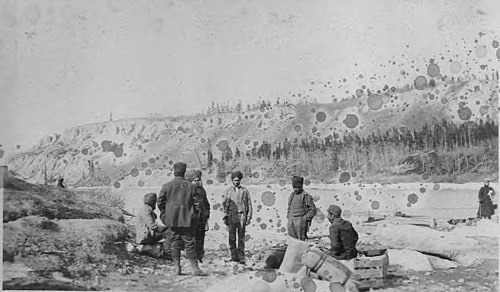
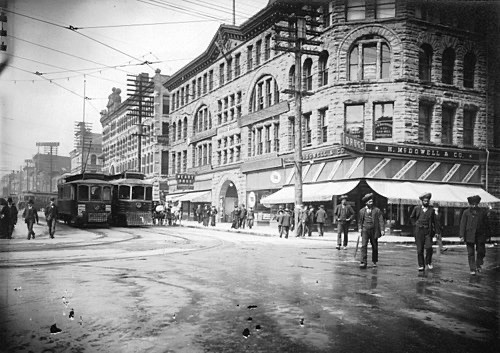
Punjabi Sikhs in Whitehorse and Vancouver, 1906 and 1908
Sikhs are the fourth-largest religion in Canada, and have a large population out West. Canada actually has the largest national Sikh proportion in the world (at 2.1%), and the second-largest Sikh population in the world (after India).
So naturally, some of them would want to join the RCMP.
I’m going to let this article from the CBC tell this story far better than I could:

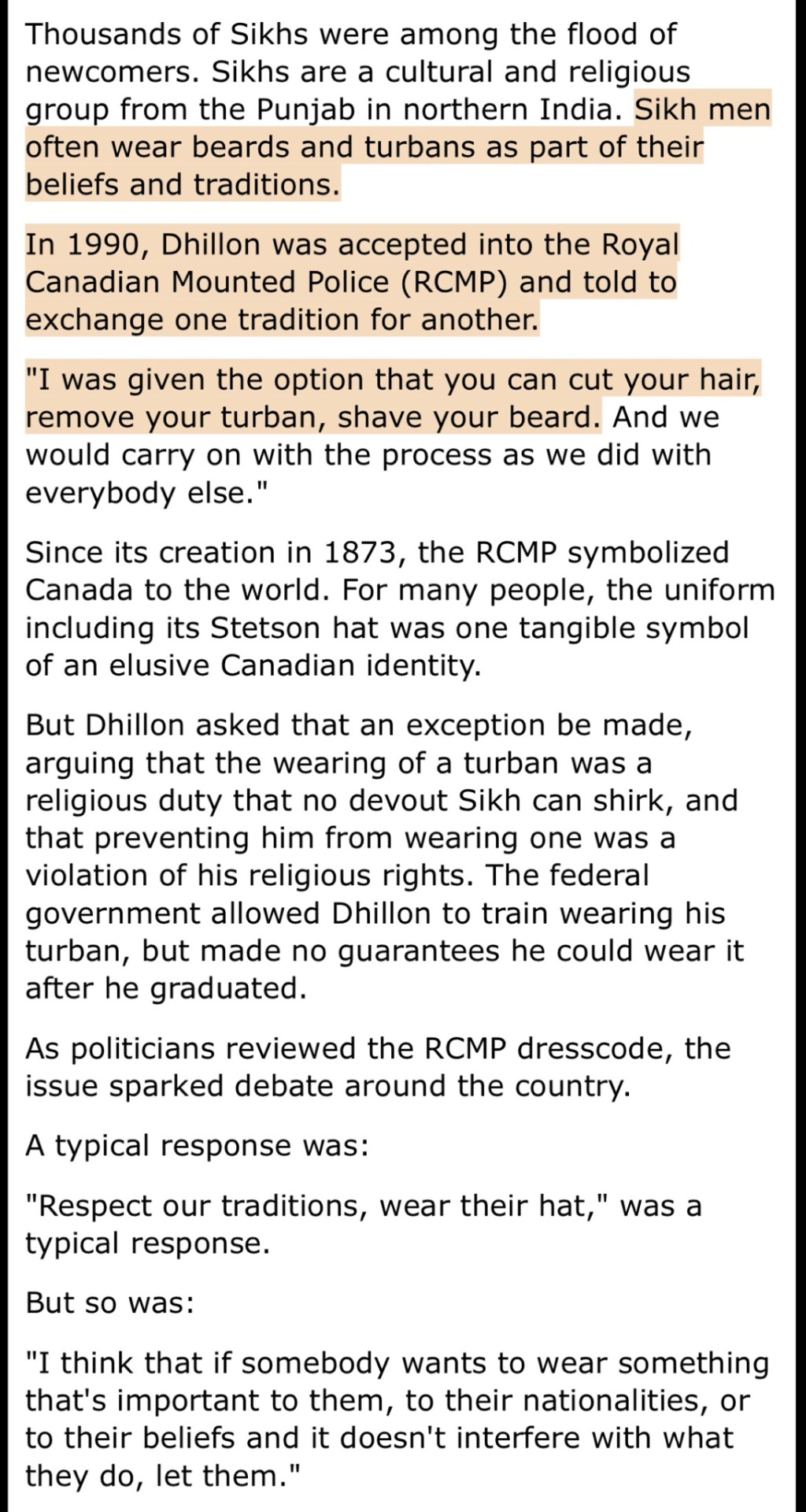
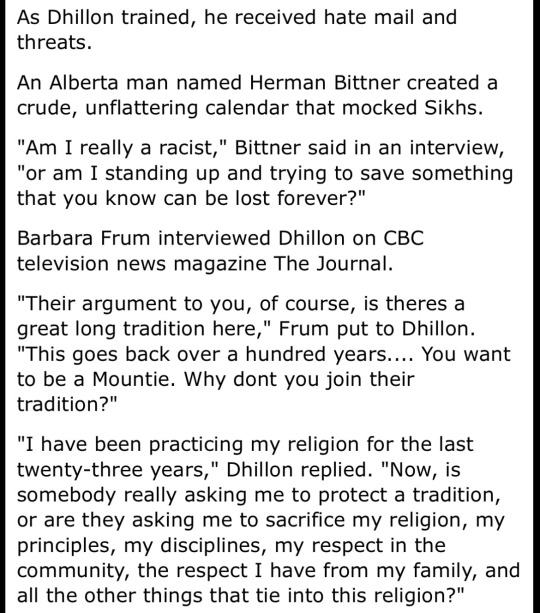

And so that’s why, for a brief moment, due South shows us a Sikh officer in a turban outside RCMP HQ.
(Which is actually the Canadian Blood Services HQ, in the building of what was once the Victoria Hospital for Sick Children, built in 1892!)

Quiet Canadiana in due South [more]
74 notes
·
View notes
Text
I can't ask you to boycott Tesla...
...because I know the vast majority of Tumblr can't buy a Tesla. Musk's views have resulted in plummeting Tesla sales in 2024 - !as much as 63% in France!
But there IS another way to defund Elon Musk, and that is to write to advertisers on X (formerly Twitter) and pressure them to withdraw.
I know a lot of us have left, but if you have an old account on there and don't mind quiet, grindy, but highly impactful direct action, here is a step-by-step guide.
Choose 1-3 advertisers that are
Not affiliated with Musk/DOGE/Tesla/SpaceX/Starlink or the US Federal government. US State government entities and initiatives are probably OK to contact. Non-US government bodies are even better choices.
Have a contactable presence outside of Twitter; eg. an email address for complaints, a website feedback form etc.
Pay at least lip service towards diversity, equality and/or accessibility in a mission statement, organisational pledge, or through the use of inclusive imagery and language.
Avoid:
Advertisers ideologically aligned with Musk, or targeting specific individuals. Many far right think tanks and individuals take out advertising on Twitter. Some are likely sock puppets of Musk’s own allies. Look for vague buzzwords about ‘improving efficiency’, ‘anti-woke’, ‘free speech’ etc. Don’t waste your time on them.
Cryptocurrency exchanges, as they're probably scammers to start with.
Now, to create your letter!
1 – Save a screenshot of the ad for attachment to your message. Not every personnel assigned to handling complaints is aware of every ad campaign.
2 – Begin by highlighting the relevance of the org or company to you eg.
“I am a taxpayer in (state/country/region)…”
“As a customer/fan/subject matter expert of …”
“As someone who uses similar products/services…”
3 – State your reaction to the ad, eg.
“…I am disappointed/shocked/upset to see your advertisement on X (formerly twitter).”
4 – Explain why Pick a mixture of ideological and financial reasons
Ideological:
Musk’s bigoted views, citing examples. Eg. nazi salutes, transphobia etc
The impact of DOGE on vulnerable Americans and/or the impact of withdrawing USAID overseas.
Permissiveness towards bigotry and abuse on X eg. Andrew Tate, Nazi accounts, ubiquitous bullying
… and that these run counter to the organisation’s / company’s values and image, quoting their own mission statements if desired; and that they risk tarnishing their brand through association. I haven’t added example URLs for these as there are simply way too many choices!
Financial:
Bot and inauthentic activity on X is greater than that of authentic users (references: https://www.abc.net.au/news/science/2024-02-28/twitter-x-fighting-bot-problem-as-ai-spam-floods-the-internet/103498070 , https://mashable.com/article/x-twitter-elon-musk-bots-fake-traffic , https://journals.plos.org/plosone/article?id=10.1371/journal.pone.0313293
Very high incidence of click fraud (false and manufactured engagement with advertising, increasing advertisers’ expenditure) references: https://www.socialmediatoday.com/news/new-report-finds-x-may-be-inflating-ad-performance-results/707860/ , https://searchengineland.com/x-surge-traffic-fake-437715
Reluctance of users to engage with ads due to numerous advertisements by scammers eg. https://www.bleepingcomputer.com/news/security/x-users-fed-up-with-constant-stream-of-malicious-crypto-ads/ , https://www.cbc.ca/news/canada/cbc-ads-fake-investment-scheme-1.7439812 , https://uk.finance.yahoo.com/news/celebrity-deepfake-scam-ads-were-000100107.html?guccounter=1
5 – State the consequences of continuing to advertise on X
“I believe this is a waste of taxpayers’ money that could be better spent elsewhere…”
“Continuing to advertise on X harms your company’s / organisation’s image…”
“If you continue to advertise on X, I will take my business to your competitor…”
6 – Sign off
Yours Sincerely, (your name/pseudonym)
---------------------
Over time, you can build a toolbox of sentences to put together and create unique letters for each advertiser. If you have time to doomscroll, you have time to do this, and it only takes as few as 2-3 people writing in to get an advertiser to reconsider.
13 notes
·
View notes
Text
Facing the bitter cold, along with an angry country, Canadian Prime Minister Justin Trudeau announced his resignation Monday, saying he stayed in the job amid plunging popularity because he was a “fighter.” In his typical self-absorbed style, the prime minister thanked no one but acknowledged in so many words that he was pushed out by his own caucus.
When asked by a reporter if another leader might be better able to confront opposition leader Pierre Poilievre — whose Conservative Party leads Trudeau’s Liberal Party by 25 points in most polls — in the next election, the prime minister pontificated on the progressive politics that made him famous and that he pushed for nine years in office. He also alluded to what he saw as the dangers of the incoming Trump administration.
“Pierre Poilievre’s vision for this country is not the right one for Canadians,” Trudeau said, taking his rival to task for wanting to “(stop) the fight against climate change,” not focusing on “diversity,” and “attacking journalists” and the Canadian Broadcasting Corporation (CBC).
A former drama teacher and ski instructor, Trudeau swept to office as a progressive poster child in 2015, campaigning on “sunny ways” and doing things better. He leaves office a deeply unpopular and divisive figure — with progressive politics on the wane around the world — as Canadians seethe over the high cost of living, crime and disorder, the fallout of high immigration levels, and the cost of his climate policies. His resignation speech encapsulated the sense that he’s out of touch, too, obsessing over issues such as guns and abortion, longtime wedge issues in Canadian politics, rather than pocketbook issues as the Canadian population becomes progressively poorer in comparison to their American neighbors.
14 notes
·
View notes
Text
While the administration claims the move is a return to "biological facts," experts say it ignores both biological and historical reality — that humans have never fit into just two sexes or two genders.
"The terminology could be new, people's awareness could be new, but the idea or the practice of changing gender is hardly new. It is observed in every time period in U.S. history," said Jules Gill-Peterson, an associate professor of history at Johns Hopkins University in Baltimore.
[...]
Following the executive order, trans and non-binary Canadians have told CBC they're concerned about travelling in the U.S. and afraid that this unravelling of trans rights could creep north even more than it already has.
At least 100,000 people in Canada reported being trans or non-binary in the 2021 census. In 2017, Bill C-16 added protections for transgender and gender-diverse people to the Canadian Human Rights Act and Criminal Code.
When asked about Trump's executive orders, Conservative Leader Pierre Poilievre said he was "only aware of two" genders, adding that he believes the government should let people "make their own personal decisions."
It's "ignorant" to claim there are only two genders, said Benny Michaud, director of the Centre for Indigenous Initiatives, an adjunct professor at Carleton University in Ottawa and a citizen of the Metis Nation.
"There have always been LGBTQIA+ people, and it's such a disservice to Canadians for that not to be acknowledged by somebody that is vying for the highest position of leadership within the country."
15 notes
·
View notes
Text
11 notes
·
View notes
Text
Transgender activists and allies on Monday decried the Vatican's new doctrine against gender-affirming surgery as "hurtful" and devoid of the voices and experiences of trans, non-binary and gender-diverse people, especially in its distinction between transgender and intersex people. "The suggestion that gender-affirming health care — which has saved the lives of so many wonderful trans people and enabled them to live in harmony with their bodies, their communities and (God) — might risk or diminish trans people's dignity is not only hurtful but dangerously ignorant," said Mara Klein, a non-binary, transgender activist who has participated in Germany's church reform project. "Seeing that, in contrast, surgical interventions on intersex people — which if performed without consent especially on minors often cause immense physical and psychological harm for many intersex people to date — are assessed positively just seems to expose the underlying hypocrisy further," Klein said. The Vatican on Monday declared gender-affirming surgery as well as surrogacy as grave violations of "human dignity," putting them on par with abortion and euthanasia as practices that it says rejects God's plan for human life.
Continue Reading
41 notes
·
View notes
Text
Canadian residents are racing to save the data in Trump's crosshairs
Guerilla effort underway to preserve medical, environmental data from deletion
Elizabeth Thompson · CBC News · Posted: Feb 13, 2025 5:00 AM AST | Last Updated: 5 hours ago

Donald Trump speaks at a campaign rally at Mullett Arena, Thursday, Oct. 24, 2024. U.S. government web pages and data are being rapidly taken offline by Trump's administration. (Alex Brandon/The Associated Press)
The call to Angela Rasmussen came out of the blue and posed a troubling question. Had she heard the rumour that key data sets would be removed from the U.S. Centers for Disease Control and Prevention's website the next day?
It's something Rasmussen had thought could never happen.
"It had never really been thought of before that CDC would actually start deleting some of these crucial public health data sets," said the University of Saskatchewan virologist. "These data are really, really important for everybody's health — not just in the U.S. but around the world."
The following day, Jan. 31, Rasmussen started to see data disappear. She knew she needed to take action.
Rasmussen reached out to a bioinformatician friend, who knew how to preserve data and make backup copies of websites. With others, they scrambled to preserve the data in case it was deleted.

"We set about archiving the entire CDC website," said Rasmussen.
Since then, Rasmussen and her colleague have teamed up with others like American health-care data analyst Charles Gaba and turned their attention to other sites with health data, preserving information from departments and agencies like the Food and Drug Administration (FDA) and the Centers for Medicare & Medicaid Services.
Rasmussen said the publication of some studies, such as three that would shed light on H5N1 bird flu, also appear to be affected by the change of administration.
Rasmussen is just one of several Canadian residents who have joined what has become an international guerilla archiving effort to preserve copies of U.S. government web pages and data being rapidly taken offline by U.S. President Donald Trump's administration.

University of Saskatchewan virologist Angela Rasmussen is among those who have been working to preserve copies of medical data being taken offline by the Trump administration. (Submitted by the University of Saskatchewan)
An analysis by the New York Times identified thousands of pages taken down in the days following Trump's inauguration, in part as a result of Trump's executive order targeting diversity initiatives.
Among the pages observers have seen disappear are ones that monitor HIV infections, deal with health risks for youth and contain census data, education data and information about assisted reproduction technologies. A website containing the names of those charged in connection with the Jan. 6, 2021, attack on the Capitol was also removed.
A comparison of the U.S.data.gov home page on Jan. 17, before Trump's inauguration, and Wednesday, shows 522 fewer data sets.
Some commenters on social media liken the disappearing data to book burning in the 1930s.
Asked about the changes to the CDC's website, the agency said it is part of changes across the Department of Health and Human Services (HHS).
"All changes to HHS and HHS division websites/manuscripts are in accordance with President Trump's Jan. 20 executive orders," senior press officer Rosa Norman said in an emailed response.
The Environmental Protection Agency (EPA) has yet to respond to questions from CBC News.
It is not known whether the data still exists on government servers.
Those archiving the data argue that it was paid for with U.S. tax dollars and should be in the public domain, accessible to researchers and everyone else.
The government has argued that the deletions are not necessarily final and that the information can be accessed via the Internet Archive's Wayback Machine.
Tuesday, a U.S. federal judge granted a temporary order, directing the CDC and the FDA to restore public information on their websites while the courts hear a lawsuit challenging the Trump administration's decision to remove it.
Internet archives sometimes miss data
Brewster Kahle is the founder of the Internet Archive (IA), which crawls the web and archives copies of websites. His non-profit organization is part of the End of Term Web Archive project which has documented U.S. government websites at the end of each administration since 2004 and launched the Democracy's Library project, a collection of government research and publications from around the world.
However, the Internet Archive's crawlers don't always pick up data sets and databases.
Those working to preserve U.S. government data sets are downloading them and, in many cases, storing them with the help of the Internet Archive.
"The efforts of these co-operating entities has yielded much, much more data being archived this time than other times," said Kahle. "I think that's an indication of people being extremely enthusiastic about trying to make sure that the government record is kept whole."

Brewster Kahle is the founder of non-profit digital library Internet Archive which is helping to store some copies of the U.S. government data removed from the web in Canada. (Submitted by Brewster Kahle)
Kahle said to date, the U.S. government hasn't gone after government data stored by the Internet Archive.
"That would be highly unusual. We've never had anything like that happen," Kahle said.
However, should that occur, its U.S. data centre is backed up in British Columbia by the Internet Archive Canada and vice versa. Kahle said the Democracy's Library project is also housed in Canada.
"That's what libraries do. We're there to keep a record of what has happened — that's a role that we play," said Kahle. "Canada is always there to help out the United States Internet Archive."
At the University of Guelph, geography professor Eric Nost is working with the Environmental Data Governance Initiative (EDGI) to preserve data from the EPA — particularly related to climate change and environmental justice.
"This data has a lot of importance in terms of being able to track environmental changes, to identify, for instance, what places are most burdened by pollution in the U.S., where the pollution is, where climate hazards exist," Nost said. "That's obviously very important to Americans, but it also has real relevance to Canadians as well."
For example, some Canadian cities are downwind from American factories, he said.
"Having access to what's coming out of the smokestacks is also really important for us."
Nost said he knows of at least three other people in Canada also working to archive environmental data. He said his group has prioritized 60 data sets or tools, archived most of them and reconstructed tools like the EPA's EJScreen.
Nost said his group is also finding that some websites are currently blocked to anyone accessing them from outside the U.S. such as the Federal Emergency Management Agency's national risk index map.
Matt Price, an associate professor at the University of Toronto who is also working with EDGI, says preserving the data is important because the U.S. is the biggest scientific powerhouse in the world.
"We should care about American data because the American federal government has been the default custodian of large quantities of data that the whole world needs," Price said.
Jessica Mahr is a Toronto-based employee for the Environmental Policy Innovation Center helping co-ordinate different groups trying to archive U.S. government environmental data. She says the data and tools being removed affects research that informs policy to improve quality of life.
"Without those tools you're not able to have an informed understanding of who is suffering and then where to provide them with funding or programs that would improve their lives," Mahr said.
6 notes
·
View notes
Text
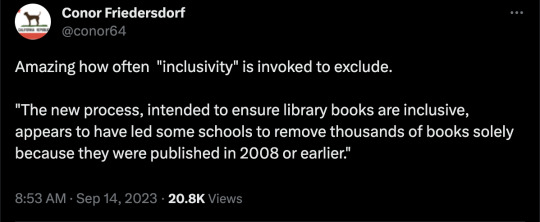
By: Nicole Brockbank, Angelina King
Published: Sep 13, 2023
Harry Potter, The Hunger Games and Roll of Thunder, Hear My Cry.
Those are all examples of books Reina Takata says she can no longer find in her public high school library in Mississauga, Ont., which she visits on her lunch hour most days.
In May, Takata says the shelves at Erindale Secondary School were full of books, but she noticed that they had gradually started to disappear. When she returned to school this fall, things were more stark.
"This year, I came into my school library and there are rows and rows of empty shelves with absolutely no books," said Takata, who started Grade 10 last week.
She estimates more than 50 per cent of her school's library books are gone.
In the spring, Takata says students were told by staff that "if the shelves look emptier right now it's because we have to remove all books [published] prior to 2008."
Takata is one of several Peel District School Board (PDSB) students, parents and community members CBC Toronto spoke to who are concerned about a seemingly inconsistent approach to a new equity-based book weeding process implemented by the board last spring in response to a provincial directive from the Minister of Education.
They say the new process, intended to ensure library books are inclusive, appears to have led some schools to remove thousands of books solely because they were published in 2008 or earlier.
Parents and students are looking for answers as to why this happened, and what the board plans to do moving forward.
Prior to publication, neither Ontario Education Minister Stephen Lecce's office, nor the Education Ministry, would comment on PDSB's implementation of Lecce's directive when contacted by CBC Toronto.
But in a statement Wednesday, the education minister said he has written to the board to immediately end this practice.
"Ontario is committed to ensuring that the addition of new books better reflects the rich diversity of our communities," said Lecce.
"It is offensive, illogical and counterintuitive to remove books from years past that educate students on Canada's history, antisemitism or celebrated literary classics."
Weeding books by publication date raises concerns
The process of weeding books from a library isn't new.
Libraries across the country follow weeding plans to dispose of damaged, mouldy and outdated books and to ensure their collections remain a trusted source of current information.
But Takata, who is of Japanese descent, is concerned weeding by publication date doesn't follow that norm and will erase important history.
"I think that authors who wrote about Japanese internment camps are going to be erased and the entire events that went on historically for Japanese Canadians are going to be removed," she said.
"That worries me a lot."
Libraries not Landfills, a group of parents, retired teachers and community members says it supports standard weeding, but shares Takata's concerns about both fiction and nonfiction books being removed based solely on their publication date.
The group is also concerned about how subjective criteria like inclusivity will be interpreted from school to school in the later stages of the equity-based weeding process.
Tom Ellard, a PDSB parent and the founder of Libraries not Landfills, said teachers reached out to them to help raise awareness about the weeding process.
"Who's the arbiter of what's the right material to go in the library, and who's the arbiter of what's wrong in our libraries? That's unclear," he said. "It's not clear to the teachers who've provided us this material, and it's not clear to me as a parent or as a taxpayer."
Ellard says he's talked to the parent council, his son's principal and his school board trustee. He's also contacted members of the provincial government, but says he hasn't received a substantial response about what happened in the spring and how the process is intended to work.
School board defends process
CBC Toronto requested an interview with the PDSB to discuss how the weeding process works and how the board plans to proceed in the wake of concerns from parents and students. A spokesperson said staff were not available to speak as they were "focusing on students and school families this week."
The board did not address questions about empty shelves, the volume of books removed and reports about weeding books based on the date of publication.
Instead, the board issued statements explaining that the process of weeding books from school libraries was completed in June and has always been a part of teacher librarian responsibilities within PDSB and at school boards across the country.
"Books published prior to 2008 that are damaged, inaccurate, or do not have strong circulation data (are not being checked out by students) are removed," said the board in its statement.
If damaged books have strong circulation the board says they can be replaced regardless of publication date, and older titles can stay in the collection if they are "accurate, serve the curriculum, align with board initiatives and are responsive to student interest and engagement."
"The Peel District School Board works to ensure that the books available in our school libraries are culturally responsive, relevant, inclusive, and reflective of the diversity of our school communities and the broader society," said the board.
Weeding a response to minister's directive
CBC Toronto reviewed a copy of the internal PDSB documents Ellard's group obtained, which includes frequently asked questions and answers provided to school staff by the board, and a more detailed manual for the process titled "Weeding and Audit of Resource in the Library Learning Commons collection."
The documents lay out an "equitable curation cycle" for weeding, which it says was created to support Directive 18 from the Minister of Education based on a 2020 Ministry review and report on widespread issues of systematic discrimination within the PDSB.
Directive 18 instructs the board to complete a diversity audit of schools, which includes libraries.
"The Board shall evaluate books, media and all other resources currently in use for teaching and learning English, History and Social Sciences for the purpose of utilizing resources that are inclusive and culturally responsive, relevant and reflective of students, and the Board's broader school communities," reads the directive.
How weeding works
PDSB's "equitable curation cycle" is described generally in the board document as "a three-step process that holds Peel staff accountable for being critically conscious of how systems operate, so that we can dismantle inequities and foster practices that are culturally responsive and relevant."
First, teacher librarians were instructed to focus on reviewing books that were published 15 or more years ago — so in 2008 or earlier.
Then, librarians were to go through each of those books and consider the widely-used "MUSTIE'' acronym adapted from Canadian School Libraries. The letters stand for the criteria librarians are supposed to consider, and they include:
• Misleading – information may be factually inaccurate or obsolete. • Unpleasant – refers to the physical condition of the book, may require replacement. • Superseded – book been overtaken by a new edition or a more current resource. • Trivial – of no discernible literary or scientific merit; poorly written or presented. • Irrelevant – doesn't meet the needs and interests of the library's community. • Elsewhere – the book or the material in it may be better obtained from other sources.
The deadline to complete this step was the end of June, according to the document.
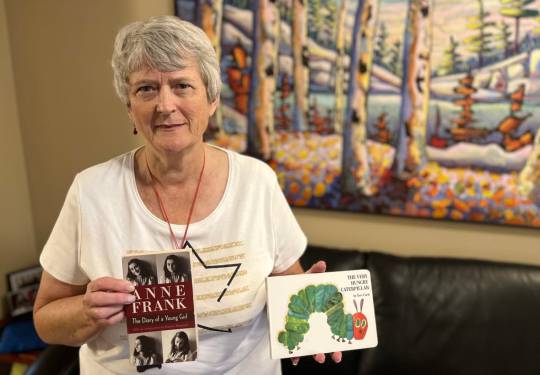
[ Dianne Lawson, a member of Libraries not Landfills, says teachers told her The Diary of a Young Girl by Anne Frank and The Very Hungry Caterpillar by Eric Carle were removed from their school libraries as part of the PDSB weeding process. ]
Step two of curation is an anti-racist and inclusive audit, where quality is defined by "resources that promote anti-racism, cultural responsiveness and inclusivity." And step three is a representation audit of how books and other resources reflect student diversity.
When it comes to disposing of the books that are weeded, the board documents say the resources are "causing harm," either as a health hazard because of the condition of the book or because "they are not inclusive, culturally responsive, relevant or accurate."
For those reasons, the documents say the books cannot be donated, as "they are not suitable for any learners."
A PDSB spokesperson said the board supports its schools "in the disposal of books in a responsible manner by following Peel Region's recycling guidelines." Peel Region allows for the recycling of book paper, as long as hard covers and any other plastics are removed first and put in the garbage.
Books removed based on date, board heard
It was during the first stage of the new equitable curation cycle, that Takata, Libraries not Landfills, and at least one trustee, say some schools were removing books strictly based on publication date.
CBC Toronto recently reviewed a recording of a May 8 board committee meeting focused on the new equitable weeding process. In it, trustee Karla Bailey noted "there are so many empty shelves," when she walks into schools.
"When you talk to the librarian in the library, the books are being weeded by the date, no other criteria," Bailey told the committee.
"That is where many of us have a real issue. None of us have an issue with removing books that are musty, torn, or racist, outdated. But by weeding a book, removing a book from a shelf, based simply on this date is unacceptable. And yes, I witnessed it."
Bernadette Smith, superintendent of innovation and research for PDSB, is heard responding on the recording, saying it was "very disappointing" to hear that, because she said that's not the direction the board is giving in its training for the process.
Dianne Lawson, another member of Libraries not Landfills, told CBC Toronto weeding by publication date in some schools must have occurred in order to explain why a middle school teacher told her The Diary of a Young Girl��by Anne Frank was removed from shelves. She also says a kindergarten teacher told her The Very Hungry Caterpillar had been removed as well.
"She has read it to her classes for years, they love it," Lawson said, referring to the Eric Carle picture book.
"I can't find any sedition in it, or any reason why you would pull this book."
Process 'rolled out wrong,' trustee chair says
Trustee and chair of the board, David Green, told CBC Toronto the weeding process itself "rolled out wrong."
That's why he says trustees briefly paused the process until the board could get a better understanding of what was actually going on.
A motion was passed at a May 24 board meeting to ensure that, going forward, those weeding books during the anti-racist and inclusive audit in the second phase of the curation cycle would need to document the title and reason for removal before any books were disposed of.
"We have to make sure that we are meeting the needs of the students and not just rolling something out because we were told to do it," said Green.
When it comes to removing all books published in 2008 or earlier, Green said the board of trustees has heard that, too.
"We have asked the Director [of Education] again to make sure that if that is taking place, then that is stopped, and then the proper process is followed," he said.
Green also said they have plans to communicate with parents about the weeding process.
In the meantime, students like Takata are left with half-empty shelves and questions about why they weren't consulted about their own libraries.
"No one asked for our opinions," she said. "I feel that taking away books without anyone's knowledge is considered censorship."
==
Even given it was "rolled out wrong," it's interesting that some librarians saw no issue with the actions they took.
Which doesn't bode well for the overtly ideological "second phase," in which classic and of-the-time literature is judged through the shallow, postmodern "microaggressions" of present-day activist librarians.
It's always been the people who most want to ban books like "To Kill A Mockingbird" who are the ones who most need to read them.
This is what a purge of history looks like.
#libraries#censorship#literature#microaggressions#history purge#diversity#equity#inclusion#diversity equity and inclusion#antiracism#antiracism as religion#woke#wokeism#cult of woke#wokeness as religion#religion is a mental illness
39 notes
·
View notes
Text
Black History month (Canada edition)
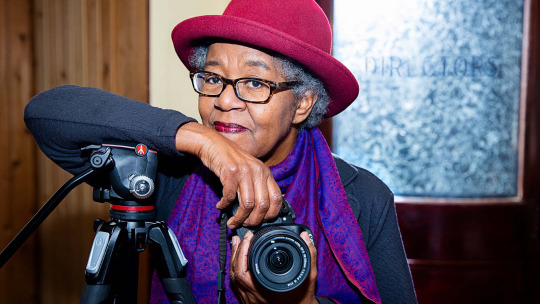
Sylvia D. Hamilton
Sylvia D. Hamilton is an award-winning filmmaker, writer, and educator. Growing up in Beechville, Nova Scotia, she attended a segregated school as a child. In high school, she was one of the only Black students. She was Beechville’s first high school graduate and went on to receive her bachelor’s degree from Acadia University in 1972, and her master’s degree from Dalhousie University in 2000.
In 1975, Hamilton joined Halifax’s Reel Life Film and Video Collective, which encouraged self-representation for female filmmakers. In 1990, she co-created the New Initiatives in Film program for the women’s unit of the National Film Board. She has held the Nancy’s Chair in Women’s Studies at Mount Saint Vincent University (Halifax), and was the Chair of the Women in Media Foundation. In both her writing and films, she draws on collective experiences to document diverse and inclusive communities to make people aware of history that has been missed.
Hamilton’s films include Black Mother Black Daughter (1989), Speak it! From the Heart of Black Nova Scotia (1992), Portia White: Think On Me (2000), and The Little Black School House (2007). Her films have been seen at festivals in Canada and abroad, telecast on CBC TV, Bravo, VisionTV, TVO, and The Knowledge Network, and used as educational tools in schools and universities across Canada.
Among many accolades, she has received a Gemini Award, The Portia White Prize, the CBC Television Pioneer Award, the Queen’s Diamond Jubilee Medal, and three honorary degrees from Nova Scotian universities.
2 notes
·
View notes
Text
More than 400 Canadian artists from the worlds of music, film and literature are denouncing what they describe as "alarming and destructive" anti-trans legislation in an open letter released Sunday by music superstars Tegan and Sara.
The list of stars who signed the letter includes actor Elliot Page, Great Big Sea frontman Alan Doyle, actress Elisha Cuthbert, folk music legend Neil Young, recent Grammy winner Allison Russell and the two surviving members of classic children's entertainment act Sharon, Lois and Bram.
"The anti-trans policies taking root in Canada go beyond discrimination — they present a clear risk to the mental and physical well-being of trans individuals throughout the country," reads the letter.
The letter calls out Alberta Premier Danielle Smith's planned pronoun policies for gender diverse children in schools, as well as proposed restrictions for youth seeking gender-affirming care.
7 notes
·
View notes
Text
Members of an Indigenous advisory committee at the Royal Winnipeg Ballet say they're cutting ties with the organization after seven years. The Indigenous advisory circle — comprising lawyer Danielle Morrison, two-spirit elder Albert McLeod and University of Winnipeg professor Kevin Lamoureaux — resigned en masse along with a board member via letter on Friday afternoon. The advisory circle, formed in 2018, was intended to make Canada's oldest ballet company "a more equitable, diverse and inclusive organization," the ballet's website says.
Continue reading
Tagging: @newsfromstolenland
#winnipeg royal ballet#indigenous#first nations#natives#cdnpoli#canada#canadian politics#canadian news#canadian#manitoba
121 notes
·
View notes
Text
The Impact of Convergence in Daily Media Habits
I have noticed an increasing dependence on media convergence in my personal media consumption in recent years. The convenience of having all media available at my fingertips is incredible, and as humans we are so susceptible to finding the path of least resistance and taking the easy route. However, between the threat of losing locally produced media content and the echo chamber effect of receiving news from the same source, it is never more important to consider the importance of applying critical thought in personal media use.
The world has undergone lightening-fast transformations in the growth of technology during the ever progressing digital age. Traditional broadcasting faces challenges to survive in the modern world. It is critical that traditional sources adapt to maintain diverse media content in an online age. For a Canadian example, I recall watching many hours of broadcasting from the Canadian Broadcasting Company (CBC) when I was a child. At that point in my life, my media consumption was almost exclusively Canadian; watching episodes of shows on CBC such as “The Littlest Hobo” and “This Hour Has 22 Minutes” provided almost exclusive regulated Canadian content and allowed me to view the world through more of a local lens. Nowadays, my media content is from a vast amount of sources, as shown on my log. While this does have the benefit of providing a broader world perspective, the vast majority of these are not local, or even Canadian, sources.
Another concern with media convergence is the issue of an echo chamber effect, where the content the audience is exposed to is catered to their previous consumed information. This plays a significant influence on the spread of information, particularly through social media. Even with deliberate choices for diverse sources, this can cause bias in information gathering and education online. Therefore, it is always important to apply critical thought and consider the sources of the media which we consume.
2 notes
·
View notes
Text

Two years after Valérie Plante's administration said a new housing bylaw would lead to the construction of 600 new social housing units per year, the city hasn't seen a single one.
The Bylaw for a Diverse Metropolis forces developers to include social, family and, in some places, affordable housing units to any new projects larger than 4,843 square feet.
If they don't, they must pay a fine or hand over land, buildings or individual units for the city to turn into affordable or social housing.
According to data released by Ensemble Montréal, the city's official opposition, and reviewed by CBC News, there have been 150 new projects by private developers, creating a total of 7,100 housing units, since the bylaw came into effect in April 2021.
None of the units have yet been made into affordable housing, with all the developers of those projects opting instead to give Montreal financial compensation. Only 550 units are big enough to be considered family housing. Five developers ceded a piece of property to the city instead of creating affordable housing.
The money from the fees paid by developers goes into either the city's affordable housing fund or its social housing fund. Those fees have so far amounted to a total of $24.5 million — not enough to develop a single social housing project, according to housing experts
— CBC
8 notes
·
View notes